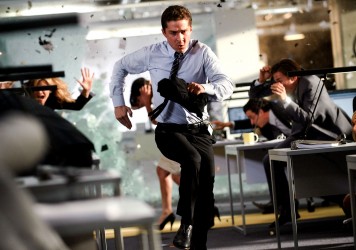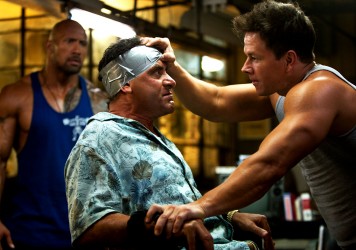Michael Bay co-opts China as his new play pen in this horrifically garish but undeniably fascinating third sequel.
If Michael Bay didn’t exist, Werner Herzog would have to invent him.
He wants too much, he flies too far, he screams and mewls to bring his unique brand of entertainment to places nature never intended for it to go. No matter the cost. No matter the death toll. Michael Bay isn’t just a soldier for cinema (to use one of Herzog’s favourite expressions), he’s its General Patton. And there can be no doubt for which country he fights.
Transformers: Age of Extinction is the fourth instalment of what has become Bay’s signature franchise — the publicly disclosed budget for the film is $165 million, and if you believe that, you might also believe Mark Wahlberg as an inventor (“I am so going to patent this!” he shouts upon firing an alien gun). His character’s name is Cade Yeager (presumably because Stacker Pentecost was already taken), and he lives with his pouty blonde daughter (living wax statue Nicola Peltz as Tessa Yeager) on a farm in Paris, Texas, which is obviously Michael Bay’s touching homage to his hero Wim Wenders. Between tinkering with useless machines in his barn and not paying his mortgage, Yeager doesn’t have a lot of free time, but he spends every second of it trying to stunt his kid’s burgeoning womanhood.
Essentially, he’s the single dad version of Martin Lawrence’s character from Bad Boys II, the supposedly endearing type of father who’d rather take his daughter to a purity ball than let her go to the prom. When it’s revealed that Tessa, who is 17, is dating a 19-year-old racecar driver, the guy promptly produces a laminated government card that proves their relationship doesn’t qualify as statutory rape in the state of Texas. It’s okay for Bay’s camera to linger on the girl’s barely covered ass — that dude has a card. One shudders at the thought of the deleted scenes.
Bay shoots the Yeager’s farm almost exclusively in the magic hour, the lens-splitting orange sun melting over the wheat fields of Texas like Days of Heaven if it were rebooted as a Super Bowl commercial. Chicago is in ruins from the spectacular battle that capped off the previous Transformers film, and humans are vaguely aware of a lingering alien presence. Cade finds Optimus Prime when scavenging for junk in an abandoned movie theatre, and before you can say “I think we found a Transformer!” a CIA death squad lead by Kelsey Grammar (aren’t they all?) arrives on the scene.
Cut to Optimus Prime riding a fire-breathing T-rex through the streets of Hong Kong as ferries rain from a death magnet hovering above the island and Stanley Tucci screams for dear life. And you may ask yourself, “Well… how did I get here?” And you may ask yourself, “Where is that large automobile?” Same as it ever was. Same as it ever was.
Bay’s first Transformers film was a spectacle as large as it was crass. Shia LaBeouf’s unctuous lead performance was an iron curtain of good will, and Bay had yet to figure out how to texture the franchise’s zealously corporate ethos in a way that made a strength of its transparency. The first sequel was the most garish victim of a writer’s strike, but also found Bay at the mercy of the technology that makes these films possible.
That’s why Dark of the Moon stands above the rest of the series and endures as one of the most exciting spectacles in mega-blockbuster history, the 3D forcing Bay to return to the fluid compositional genius responsible for The Rock and Bad Boys II, and allowing for a globetrotting script so disfigured that it was practically cubist. Dark of the Moon somehow managed to one-up the silliness of its predecessors, but its visual grace and Brakhage-like plotting resulted in a rare alchemy, drawing attention to the immaculately rendered movements that made the film feel like the summer movie equivalent of a Pina Bausch routine.
Age of Extinction isn’t nearly as elegant as its immediate predecessor — in fact, Bay’s regressive sloppiness undoes most of its pleasures — but the film almost compensates for its choppy action by congealing into an invaluable and grotesquely accurate snapshot of blockbuster globalism. For the final hour of the film, the action abruptly relocates to China because that’s where the business is. Literally, Guangdong province is the location of the last remaining Transformium lab.
But not only is everything in this movie made in China, it’s ultimately made for China, as well. The change in scenery is explained by one throwaway line of dialogue, but the reality has far more to do with the fact that China now has the second-highest box office receipts of any country in the world, and that their audiences have the power to make or break blockbuster franchises (in case you’re looking for someone to blame for the just-announced sequel to Pacific Rim). As Kevin B Lee’s Transformers premake brilliantly lays out, Age of Extinction might be the first internationally co-funded tentpole in which the story doesn’t just follow the money, the story is the money.
It’s compelling to see that dynamic unfold so transparently on screen, the metastasising corporate globalism that’s shaping the film industry rendered far more coherently than any of the alien robot battles. A lack of logic has always been the series’ charm, but if Age of Extinction makes more sense than Dark of the Moon (and that’s a big ‘if’), it’s just clear enough to be useless.
The film’s interchangeable characters are as cartoonish as everything else in Bay’s Hasbro-ised universe, and the broad comedy of their quirks is dumb enough to make you miss Shia LaBeouf. Never before has Bay done so little with so much, the global scale of his film undone by the misery of its million broken parts. The climactic battle wastes a fire-breathing alien dinosaur robot, Chicago just doesn’t blow up like it used to — the madness simply isn’t mad enough, this time around.
The first hour hangs together because Bay cogently resurrects Optimus Prime as part neglected combat veteran, part illegal immigrant, shaming the suits and politicians who left the alien to rot as soon as the fighting was over because it was politically inconvenient. It’s an interesting, if not particularly insightful way for Bay to finally redeem Ed Harris’ character from The Rock, and it’s maybe the franchise’s only bit of coherent and deliberate commentary. Tucci’s character threatens to have a genuine arc, but the lesson of his story is ultimately that having the technology to create something doesn’t mean that you should, which makes Age of Extinction the cinematic equivalent of shooting someone in the head to halfheartedly protest against gun violence.
And yet, there’s something to be said for incompetence when it’s of this scale. Even Bay apologists will be fighting an uphill battle here, but at a time when franchise filmmaking is handcuffed by formula and movies this large aspire to mediocrity, there’s something to be said for a summer spectacle where no scene can possibly predict the next, and where John Goodman voices a potbellied humanoid robot who chomps on a giant tank shell like it’s a cigar. If Bay’s slipping technical mastery guts so much of the film’s fun, his unbridled insanity insists that this is still the blockbuster event of the summer, too big to fail, too dumb to follow, and too different to dismiss.
Published 9 Jul 2014
Fool us three times… Can’t wait to get fooled again.
It’s big. It’s bad. It’s insane. It’s different.
Bay at his worst is still Bay.

An ejaculatory mess that seeks to medicate its audience with a glut of whizz-bang spills and vein-bulging fist pumps.

A frenzy of sound and fury that takes Michael Bay’s vision to its final, eye-boggling extreme.

By Adam Nayman
Feel the pump! Michael Bay’s muscle-bound satire is Bad Boys on ’roids. And that’s not a good thing.